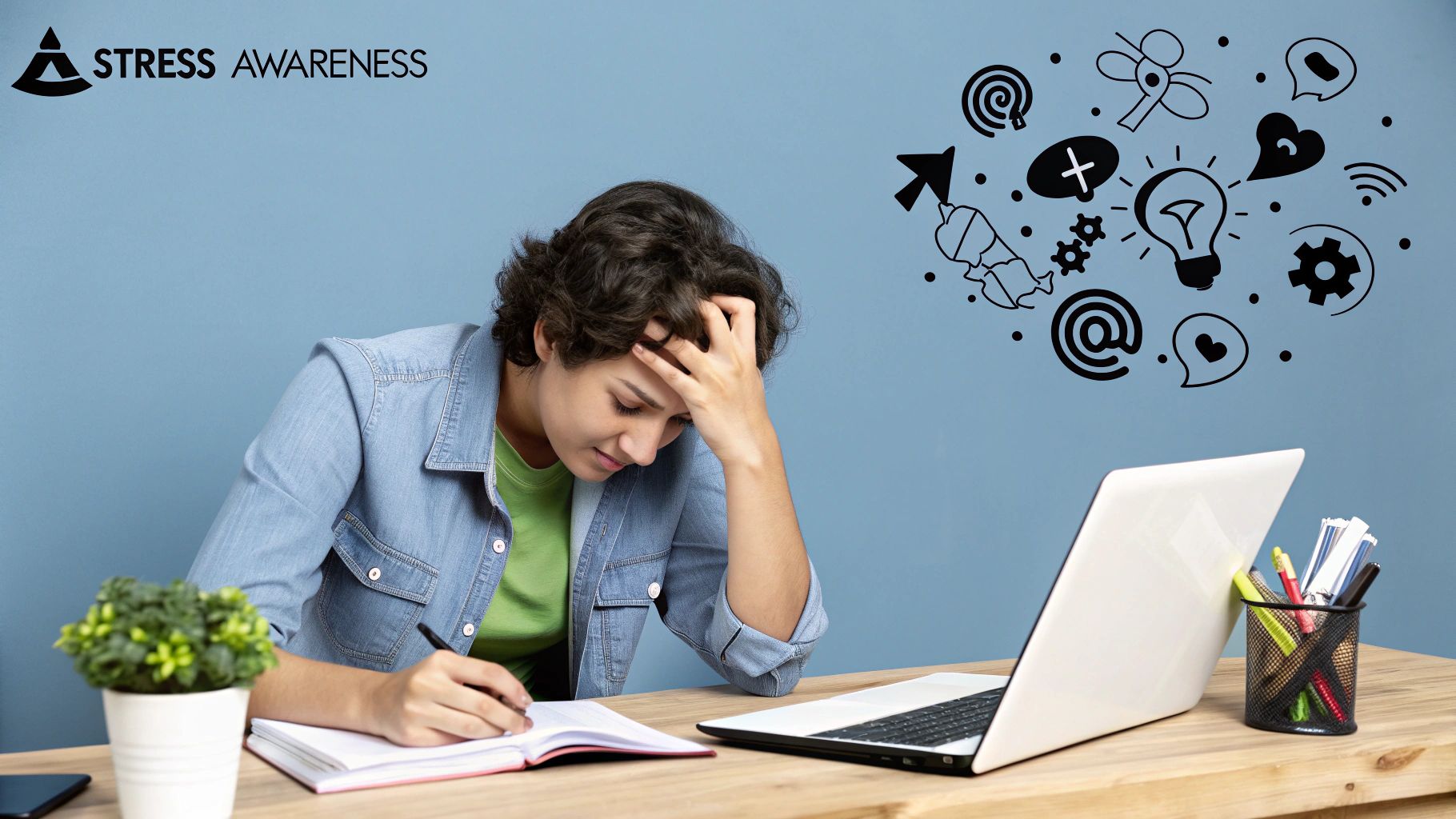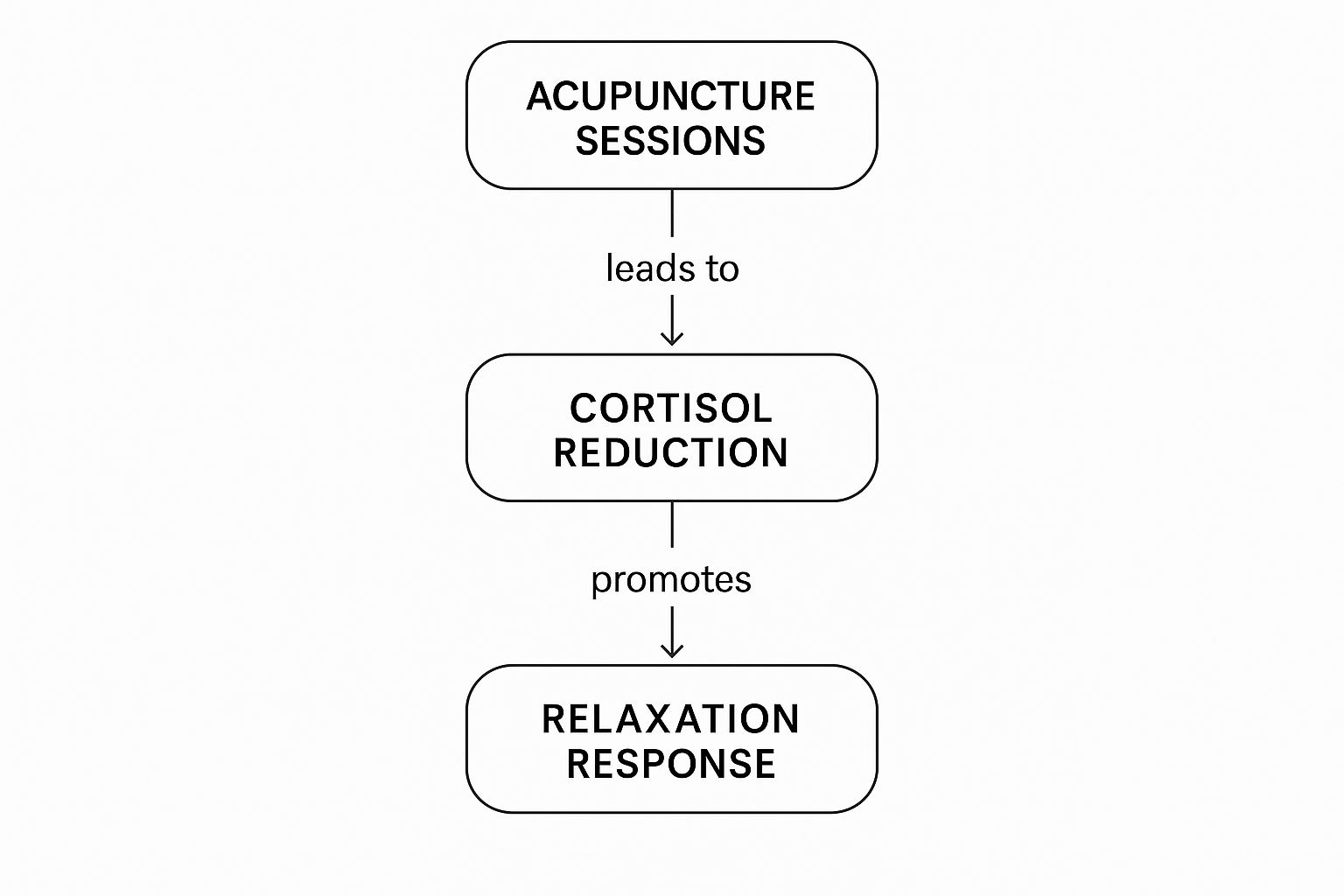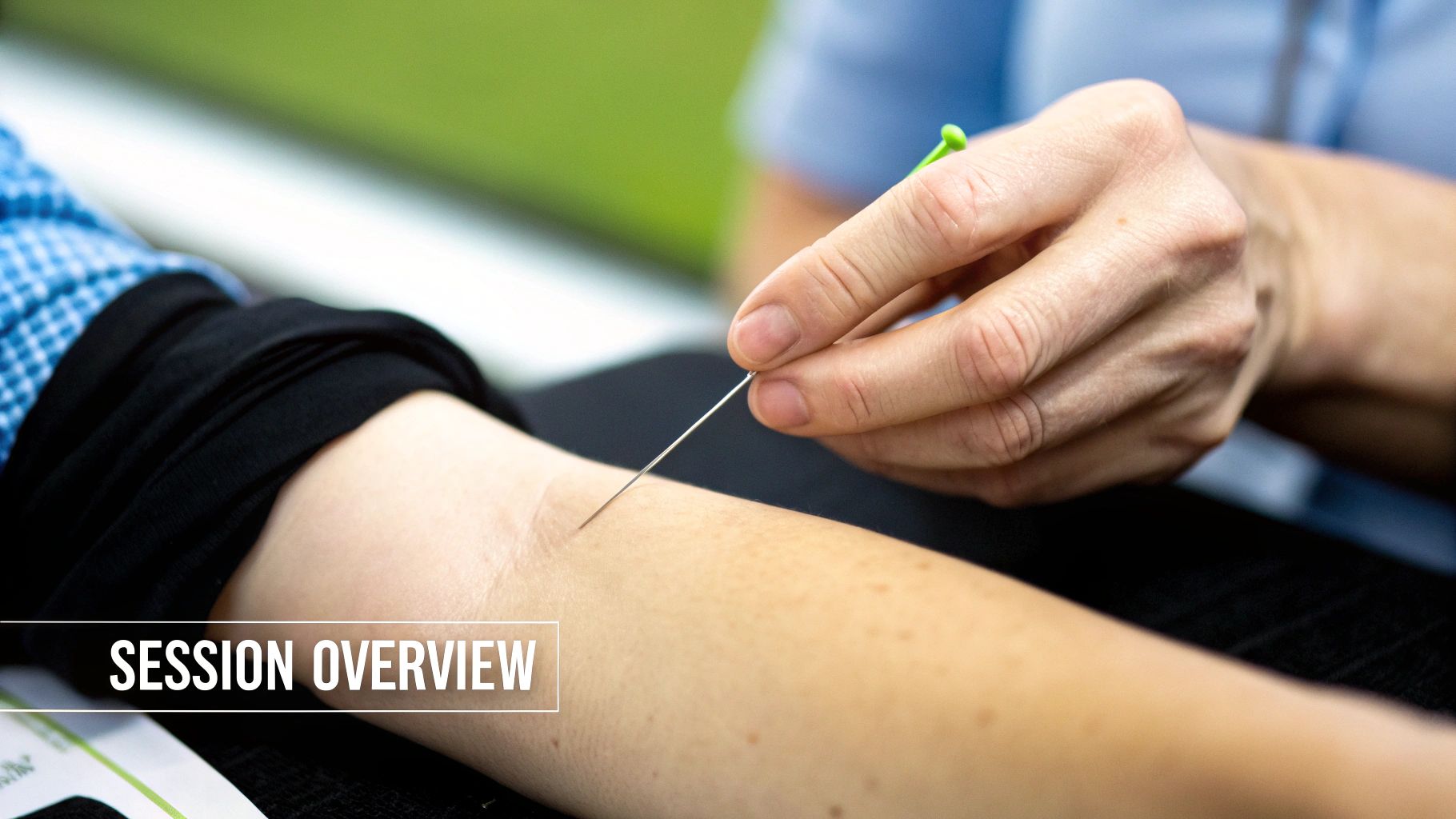In a world that seems to be constantly speeding up, chronic stress can feel like an unwelcome but permanent houseguest. The great news is that acupuncture offers a proven, deeply effective way to manage that stress and find your calm again. It's a practice that works with your body, not against it, to restore a sense of balance and provide genuine relief from the pressures of modern life.

How Acupuncture Actually Works for Stress
When you’re stressed, your body kicks into its "fight or flight" mode—a brilliant survival instinct meant for immediate, short-term threats. The problem with modern life is that this alarm system often gets stuck in the "on" position. This constant state of high alert can lead to very real health issues, from high blood pressure and terrible sleep to a compromised immune system. Acupuncture steps in to help your body find the "off" switch.
Think of the energy pathways in your body, known in Traditional Chinese Medicine as meridians, like a sophisticated highway system. Stress acts like a major traffic jam, causing blockages and disrupting the natural flow. An acupuncturist uses ultra-fine needles at very specific points along these highways to clear the congestion, essentially getting traffic moving smoothly again.
Finding Balance Beyond Simple Relaxation
This process is about so much more than just feeling relaxed for an hour. It’s about fundamental re-regulation. The treatment nudges your nervous system out of that frantic, high-alert sympathetic state and into the restorative parasympathetic state—what experts often call the "rest and digest" mode. Making this shift has a profound, cascading effect on both your body and your mind.
One of the most immediate and noticeable effects is the release of endorphins, your body's own natural pain relievers and mood boosters. These "feel-good" chemicals create a powerful sense of well-being that can linger long after you've left the treatment room.
At its core, acupuncture gives you a way to manage stress by directly influencing your body's internal chemistry. It helps lower stress hormones like cortisol and coaxes your entire system back into a state of deep, restorative calm.
To put it simply, acupuncture helps your body remember how to relax on its own. The table below breaks down the key ways it achieves this.
| Mechanism | Effect on Stress | Primary Benefit |
|---|---|---|
| Nervous System Regulation | Shifts the body from a "fight or flight" (sympathetic) state to a "rest and digest" (parasympathetic) state. | Reduces feelings of anxiety and being on high-alert, promoting physical and mental calm. |
| Hormone Balancing | Helps decrease levels of cortisol, the body's primary stress hormone. | Lowers the physiological impact of chronic stress, protecting against long-term health issues. |
| Endorphin Release | Stimulates the brain to release natural "feel-good" chemicals like endorphins and enkephalins. | Naturally improves mood, elevates spirits, and provides a powerful sense of well-being. |
| Improved Blood Flow | Increases circulation to specific areas of the body, including the brain. | Enhances the delivery of oxygen and nutrients, which helps relax muscles and calm the mind. |
As you can see, the benefits are interconnected, creating a holistic effect that addresses stress from multiple angles.
The Core Benefits for Stress Relief
Bringing acupuncture into your wellness routine is a powerful strategy for fighting back against the drain of chronic stress. It’s a method that works on both the physical symptoms and the emotional turmoil, offering a much more complete path to health. The key benefits really boil down to this:
- Calming the Nervous System: It coaches your body out of a constant state of emergency.
- Balancing Hormones: Clinical evidence shows it can effectively regulate cortisol levels.
- Improving Mood: Triggering endorphin release helps ease feelings of anxiety, frustration, and being overwhelmed.
- Enhancing Sleep Quality: When your mind and body are truly calm, you get the deep, restorative sleep you need to thrive.
How Acupuncture Calms Your Nervous System
Think of your body's stress response like a car alarm that just won't shut off. That constant, blaring noise is your sympathetic nervous system—your "fight or flight" mode—stuck in overdrive. Acupuncture acts like a skilled technician who knows exactly how to find the master switch and reset the entire system.
When an acupuncturist places those incredibly fine needles into specific points, they aren't just poking the skin. They are sending precise signals through your nerve pathways straight to your brain. This tells your body it’s safe to power down from that high-alert state and shift into the calm, healing "rest and digest" mode, which is managed by your parasympathetic nervous system. It's a gentle but direct nudge, helping your body remember how to relax on its own.
The Brain and Body Connection
So what happens in the brain when these points are stimulated? Your brain gets the message and releases a cocktail of feel-good chemicals. The most famous of these are endorphins, your body's built-in painkillers, which also produce a wonderful sense of well-being. This is why so many people feel a wave of deep relaxation or even a gentle, floaty feeling during and after a session.
But it doesn't stop there. Acupuncture also helps modulate crucial neurotransmitters like serotonin and dopamine. These are the chemicals responsible for regulating your mood, helping you focus, and experiencing pleasure. By promoting a healthier balance, the treatment starts to rewire the very brain chemistry that keeps you locked in a cycle of stress.
The real aim of acupuncture isn't just a quick fix. It's about retraining your nervous system over time. Each session reinforces the pathway to that calm, parasympathetic state, making it easier and more natural for your body to get there on its own, even when life throws its usual challenges your way.
This rebalancing act has a profound effect on one of the biggest culprits in the stress story: the hormone cortisol.
Taming the Stress Hormone
When you're constantly stressed, your body pumps out cortisol without a break. Over time, elevated cortisol can lead to serious problems like weight gain, poor sleep, and a compromised immune system. This is where acupuncture really shines. Clinical studies have shown that consistent treatment can significantly lower the levels of cortisol circulating in your bloodstream.
It works by calming the entire HPA axis—the command center for your stress response, which links the hypothalamus, pituitary, and adrenal glands. By soothing this axis, acupuncture helps put the brakes on cortisol overproduction.
This diagram helps visualize the link between acupuncture, lower cortisol, and the deep relaxation that follows.

As you can see, the treatment directly dials down stress hormones, which is the biological key to unlocking a true state of calm. This hormonal rebalancing is why acupuncture offers such effective, long-term relief from chronic stress.
The Science of Acupuncture for Stress

While many people can tell you how relaxing an acupuncture session feels, modern science is now catching up, giving us a much clearer picture of why it works so well for stress. We're moving beyond personal stories and into the world of measurable, clinical proof. This body of evidence firmly establishes acupuncture as a legitimate, data-backed therapy for navigating our high-pressure world.
At the heart of this research is a consistent finding: acupuncture treatments lead to significant, measurable reductions in the body's stress markers. One of the most critical discoveries revolves around cortisol, our primary stress hormone. Study after study has shown that a course of acupuncture can effectively lower circulating cortisol levels, helping to switch off the chronic "fight or flight" response that can be so damaging over time.
For example, one compelling study looked at 58 administrative hospital staff who were struggling with intense, work-related stress. After just eight weeks of auricular (ear) acupuncture, the group reported their stress levels dropped from high to moderate—a tangible shift in their daily experience. This change is thought to be sparked by a cascade of positive effects, including the release of endorphins and other neurotransmitters that restore emotional balance. You can dig deeper into these promising acupuncture findings for professional stress relief.
Real Versus Sham Acupuncture
So, how do we know it's not just a placebo effect? To isolate the true impact of the treatment, many high-quality studies use what’s called a randomized controlled trial. In these setups, researchers compare patients receiving genuine acupuncture with a control group receiving "sham" acupuncture, where needles might be placed in random spots or don't actually penetrate the skin.
Time and again, these rigorous studies find that real acupuncture provides statistically significant improvements in stress and anxiety when compared to the sham groups. This tells us something crucial: the precise placement of needles at specific acupoints is the key to unlocking the therapy's benefits.
The evidence all points in one direction. Acupuncture's ability to soothe the mind isn't just a feeling; it's a direct result of its power to regulate the body's physiological stress response.
Translating Research into Results
What does all this science mean for you? It means you can feel confident that choosing acupuncture for stress management is a decision grounded in solid evidence. The benefits aren't just in your head—they are real, measurable biological changes.
- Objective Stress Reduction: Research confirms acupuncture helps your body physically wind down by regulating key hormones like cortisol.
- Proven Efficacy: Trials comparing real and sham treatments validate that the results are genuine and not just a placebo effect.
- Targeted Relief: Studies focusing on high-stress groups, like busy professionals, demonstrate that acupuncture delivers meaningful relief in demanding, real-world situations.
This scientific backing elevates acupuncture from an ancient, somewhat mysterious practice into a trusted, modern tool for building resilience against whatever life throws your way.
Your First Acupuncture Session Explained
Walking into an acupuncturist's office for the first time can feel a little intimidating, but knowing what’s ahead can make all the difference. The entire process is designed to be gentle and relaxing, setting the stage for the relief you're looking for. It's your first real step toward using acupuncture for stress management.
The session starts with a simple conversation, not needles. Your practitioner needs to get a clear picture of what's going on with you, so they’ll ask about your stress symptoms, your health history, how you’re sleeping, and your daily life. This isn't just routine paperwork; it’s how they create a treatment plan that’s truly yours, like drawing a personalized map to your well-being.
The Treatment Experience
Once you've talked everything through, you’ll settle into the treatment room. You'll lie down on a comfortable table in a calm, quiet space, maybe with some soft music in the background. The idea is to help your body start unwinding even before the needles are placed.
Your acupuncturist will then begin inserting the needles at very specific points. Here’s what you need to know about this part:
- The Needles: These aren't the needles you’re used to from doctor's offices. Acupuncture needles are hair-thin, sterile, and used only once.
- The Sensation: Most people are surprised by how little they feel. There might be a tiny, momentary pinch as the needle goes in. After that, you might notice a subtle warmth, a feeling of heaviness, or a dull ache right at the point. This sensation is called “Deqi,” and it's a good sign—it means the treatment is starting to work. It should never be painful.
Once the needles are in, your job is simple: rest. You’ll relax for about 20-30 minutes, letting the treatment do its work. It's a fantastic opportunity to just let go. Many people sink into a deep state of calm, and it's not uncommon to drift off into a light, refreshing sleep.
After the Session
When the rest period is over, the practitioner will come back and gently remove the needles. It’s quick, easy, and painless. They might give you a few simple tips for the rest of your day, like drinking plenty of water or taking it easy.
Most people walk out of their first session feeling a noticeable sense of calm and clarity. While the deeper benefits for stress build up over time with more treatments, that first appointment lays a powerful foundation for finding your balance again.
How Acupuncture Works With Other Stress Relief Tools

Acupuncture is a powerful tool for managing stress, but its true potential is unlocked when it's part of a larger wellness strategy. Think of it as the anchor in your personal stress-relief plan. When you combine its deep restorative effects with other healthy habits, you create a synergy where each practice enhances the others.
For instance, the profound calm you feel after an acupuncture session creates the perfect mental state for meditation. Many people I’ve worked with find their minds are far quieter and less cluttered right after a treatment. This makes it much easier to practice mindfulness without fighting off the usual stream of distracting thoughts.
It's a two-way street. Acupuncture helps the body relax, which allows the mind to meditate more effectively. In turn, regular meditation trains your mind to hold onto that peaceful state long after the session is over. This integrated approach builds a more resilient and sustainable foundation for your well-being.
Building Your Comprehensive Toolkit
Designing a supportive routine around your acupuncture treatments can lead to deeper and more lasting change. The ultimate goal is to create a lifestyle that consistently helps regulate your nervous system, not just treat symptoms as they arise.
Here are a few complementary practices that pair beautifully with acupuncture:
- Mindfulness and Meditation: Take advantage of the post-treatment calm. Even just five minutes of focused, mindful breathing right after a session can extend the benefits and help integrate the treatment.
- Yoga or Tai Chi: These mindful movement practices are fantastic for releasing physical tension and improving the flow of energy—or qi—which is precisely what acupuncture aims to do. A gentle, restorative yoga class the day after treatment can feel incredible.
- Therapy or Counseling: Acupuncture is brilliant for addressing the physiological symptoms of stress. Pairing it with therapy allows you to work through the mental and emotional root causes. Together, they provide a holistic approach to managing stress from the inside out.
The key is to see these practices not as separate fixes, but as interconnected parts of a unified wellness strategy. Each one supports the others, helping you build a much stronger defense against life's daily pressures.
Modern research continues to back this up. A 2020 pilot study, for example, found that both real and sham acupuncture significantly lowered stress levels in participants compared to a control group. The most interesting part? The benefits were more sustained in the group that received real acupuncture.
This study underscores acupuncture's value as a core component of any effective stress management plan. You can read more about these findings on stress reduction directly from the research.
Of course. Here is the rewritten section, crafted to sound like an experienced human expert.
Beyond Stress: Broader Benefits for Mental Wellness
It's one thing to say acupuncture helps with a stressful day, but its real power lies in how that same calming effect ripples out to touch other areas of our mental health. Think of chronic stress as a gateway. When left unchecked, it often opens the door to more persistent challenges like anxiety and depression.
Because acupuncture works at such a fundamental level—influencing the very neurochemicals that dictate our moods—its benefits naturally extend to these related conditions. It’s not just about managing a single symptom; it's about helping to recalibrate your entire emotional ecosystem. The same process that quiets your body's "fight or flight" response can also lift the fog of depression or soothe the constant hum of anxiety.
Easing Anxiety and Depression
Millions of people are looking for more than just a single solution for their mental health; they want supportive therapies that complement conventional treatments, often with fewer side effects. This is where acupuncture really shines. It offers a way to address both the mental and physical sides of these conditions at the same time.
We're seeing compelling evidence for this in clinical research. For instance, a 2023 randomized controlled trial in the JAMA Open Network looked at auricular (ear) acupuncture for depression. The results were striking: a nearly 60% recovery rate among patients, with no adverse side effects. This study beautifully illustrates how targeting the body's core stress systems can lead to profound shifts in mood and emotional health. If you're interested in the specifics, you can discover more insights about acupuncture for mental health.
By treating the physiological roots of stress, acupuncture helps unwind the tightly coiled tension that fuels both anxiety and depression. It offers a path to not just manage symptoms but to cultivate a more resilient and balanced emotional state over the long term.
When you incorporate acupuncture for stress management into a broader wellness plan, you're not just treating separate issues. You’re acknowledging that stress, anxiety, and depression are often different faces of the same underlying imbalance. By getting to the root of the problem, acupuncture provides a deeply effective way to support your overall mental well-being and help you feel more like yourself again.
Common Questions About Acupuncture for Stress
Thinking about trying acupuncture for stress usually brings up a few practical questions. It's completely normal to want to know what you're getting into. Let's walk through some of the most common concerns so you can feel confident and ready to take this step.
Does Acupuncture for Stress Hurt?
This is, without a doubt, the number one question I hear. And the answer is almost always a pleasant surprise: no, it shouldn't hurt.
Acupuncture needles are incredibly thin—about the same thickness as a single strand of hair. They bear no resemblance to the thick, hollow needles used for injections or blood draws.
Most people feel a tiny, momentary prick as the needle is inserted, if they feel anything at all. After that, you might notice a subtle, dull ache, a feeling of warmth, or a sense of heaviness around the point. We call this sensation Deqi, and it’s actually a great sign. It tells us that the acupoint is activated and your body's energy is starting to respond. It should feel interesting, not painful.
How Many Sessions Will I Need?
There’s no one-size-fits-all answer here; your treatment plan will be as unique as you are. The right number of sessions really depends on how long you've been dealing with stress and how severe it is.
While many people feel a noticeable sense of calm and relaxation after just one or two sessions, creating lasting change takes consistency. Think of it like going to the gym—the real benefits build up over time.
A typical starting point might be one or two sessions per week for a few weeks. As you start to feel better and your body holds its balance for longer, we can begin spacing treatments out—first to every other week, and eventually to monthly maintenance visits. Your practitioner will work with you to create a plan that adapts to your progress.
Is Acupuncture for Stress Covered by Insurance?
Good news! Insurance coverage for acupuncture is far more common today than it used to be. However, the specifics vary quite a bit from plan to plan. Many major providers like Blue Shield, Cigna, Kaiser, and UnitedHealthcare now offer plans that cover acupuncture for certain conditions, which often include stress-related issues like chronic pain or headaches.
Here’s the best way to get a clear answer:
- Call Your Insurance Company: The most direct route is to call the member services number on your card. Ask them specifically about your benefits for "acupuncture services" provided by a licensed acupuncturist.
- Check for Covered Conditions: Ask if your plan covers acupuncture for diagnoses related to stress or anxiety.
- Let the Clinic Help: Most acupuncture clinics are pros at this. They can often contact your insurance company on your behalf to verify your benefits, which saves you a lot of time and hassle.
At Eric Tsai Acupuncture and Herbs, we want to make your path to feeling better as smooth as possible. We accept most major health insurance plans and are more than happy to provide a complimentary benefit check to see exactly what your plan covers.
Ready to start your journey toward lasting stress relief? You can book a consultation directly on our website: https://drerictsai.com.
Article created using Outrank

